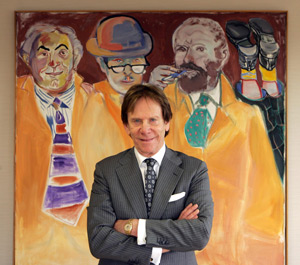
After nearly a decade of sifting through a variety of experimental treatments for an array of diseases, CytRx Corp. last week sold off about half of its pipeline to focus on cancer drug development.
Among the drugs that were sold was one that Chief Executive Steven Kriegsman had once hoped could treat Lou Gehrig’s disease. The Los Angeles company sold that drug, called arimoclomol, and two other drugs to Orphazyme ApS, a small Copenhagen drug developer specializing in genetic disease.
CytRx received an undisclosed upfront payment, but the deal potentially could be worth as much as $120 million if all development and commercialization milestones are met.
Orphazyme will focus on different uses for the drugs than CyrRx had, but Kriegsman said there is always potential for arimoclomol to be re-examined for Lou Gehrig’s.
“Better to sell it to a company with the resources to develop out the molecules, with the potential for us to earn more money if they are successful,” he said.
CytRx’s job is to shepherd its remaining three drug candidates, which are being studied to treat cancers of the prostate, lung and brain. The drugs are in six clinical trials, some of which have been completed. A seventh may launch by early next year.
“Selling arimoclomol and the other two drugs makes our story much cleaner,” Kriegsman said. “Our total focus now is developing drugs for late-stage cancers – that’s where our future lies.”
Kriegsman, the board and a medical advisory board had been contemplating a change in direction for the company for several months.
CyRx has no products on the market.
Arimoclomol had been on the U.S. Food and Drug Administration’s fast track since 2006, with a so-called “orphan drug” designation that provide incentives for drug developers to focus on medical conditions with very small markets. But the FDA hit the brakes last June, ordering the company to conduct more animal toxicology studies. That effectively delayed late-stage human studies on patients with Lou Gehrig’s disease, or amyotrophic lateral sclerosis, for at least a year.
“It was very clear to me that it was not going to be an easy road, that it was going to cost us more than it should have,” Kriegsman said.
CytRx’s stock has rarely traded above $1 in the past three years. Institutional investors have put money into the company, but less than a half dozen of them hold stakes above 1 percent of outstanding shares. Kriegsman himself is the largest shareholder, with a 3.7 percent stake now valued about $3.4 million.
Much of the investment community’s interest has been focused on the company’s large stake in RXi Pharmaceuticals Corp., a Worcester, Mass. genetic medicine company that CytRx had spun off in 2007. CytRx sold its remaining stake in RXi in January to raise about $7 million for its cancer drug trials.
CytRx’s cause has been championed on the website Seeking Alpha, which features free stock market news, conference call transcripts and commentary from a stable of money managers, investment newsletter writers and private investors.
Contributor Edward Stevenson, who specializes in overlooked and undervalued companies, says Kriegsman’s approach is praiseworthy. He endorses the streamlining strategy.
“This latest transaction is another stride that ensures shareholder value continues to be emphasized and the risk of common shareholders being diluted is negated,” he said in his blog last week.
The prospect of one day having a cancer drug on the market is important to Kriegsman for more than just business reasons – his first wife died from cancer several years ago after their divorce. A former KPMG auditor who went on to become an independently wealthy investor, the 69-year-old Kriegsman took over management of CytRx in 2002 in an effort to salvage its assets.
Kriegsman traveled to Silicon Valley last week after the announcement to chat up existing institutional investors about increasing their stakes in the company, with its market cap of $92 million, through an open market purchase that would not be dilutive.
“Considering where we are in our trials, this company is significantly undervalued,” he said.
